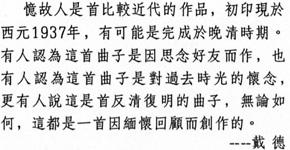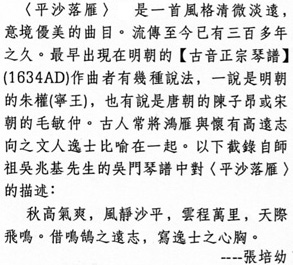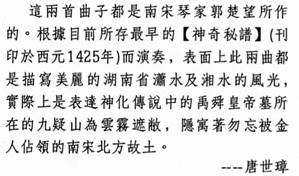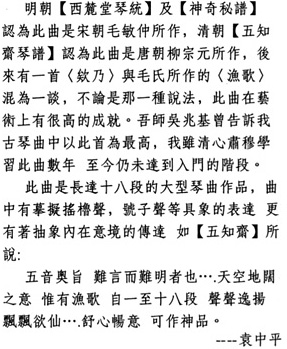| |
 Main Menu
Main Menu
選 項
Year 2000
Year 2001
Year 2002
Year 2003
| |
The Society's Members Perform
To conclude the conference, a number of New
York Qin Society members performed pieces from the
classical repertoire of the qin.
Performance Notes
Stephen Dydo
Yi Gu Ren / Memories of an Old Friend 憶故人

|

|
Yi Gu Ren is a comparatively modern work;
it first appeared in print in 1937, and was probably
written in the late Qing dynasty. Some people say
that it is about the longing
for an old friend; others say
that it refers generally to
nostalgia for bygone times; still others say that it
was a subversive tune in the Qing, referring to the
longing for a return of the Ming era. In any event,
it is clearly a backward-looking piece.
--Stephen Dydo
Peiyou Chang
Ping Sha Luo Yan/ Wild Geese Flock to Sandy Shores 平沙落雁

|

|
Wild Geese Flock to Sandy Shores has been played by many famous qin masters for the last three hundred years. Like a number of other famous qin pieces,
the authorship of the work is not that clearcut, but
respect for its antiquity can be seen from its
different attributions, one dating back to the 8-9th
centuries of the Tang. "Wild Geese" was first
published in a Ming dynasty qin handbook of
1634, the Gu Yin Zheng Zong Qin Pu (Orthodox Qin Handbook) and at one time was
said to be the work of one of the following qin
masters: the Ming dynasty Prince Ning (Zhu
Quan, died 1448), Mao Minzhong
of the late Southern Song (1127-1279), and Chen
Zi'ang of the Tang dynasty (618-907
A.D.). Found in both painting and poetry, geese
were taken as symbols of a lofty mind and high
aspirations. The contemporary qin master Wu
Zhaoji (died 1997) borrows this image to
describe what is deep in a scholar's heart:
In the crisp autumn weather, the wind is silent
over the level sands, The clouds stretch endlessly across
the horizon, the wild geese calling.
--Chang Peiyou
John Thompson
Fan Canglang / Floating on the Canglang River 泛滄浪
Xiao Xiang Shui Yun / Clouds over the Xiao and Xiang Rivers 瀟湘水雲

|

|
This pair of melodies, both attributed to the famous Southern Song qin
player Guo Chuwang, is played according to their
earliest surviving versions,
found in the Shen Qi mi pu (Handbook
of Spiritual and Marvelous Mysteries) (1425). On
the surface, the pieces evoke the beauty of two
scenic regions of Hunan province. However, the
clouds are said to block the view of the Jiuyi
mountains, reputed home of the mythical emperor
Yu Shun; this was an allegorical reference to the
Southern Song being blocked from northern China
by the alien Jin dynasty.
--John Thompson
Jung-ping Yuan
YU Ge / Fisherman's Song 漁歌

|

|
The complex history of "Fisherman's Song" reflects the lofty place that it holds in
the qin musical repertory. Two Ming dynasty
handbooks of (fin music, the Xi Lu Tang (fin tong
(preface dated 1549) and the Shen Qi
mi pu (preface dated 1425) identify the
Song master Mao Minzhong as the
composer, while the Qing dynasty handbook Wu
Zhi Zhai ain pu (preface dated 1722)
considers the composer to be the Tang poet Liu
Zongyuan (died 819). At some point in
its history, a brief section entitled "Ao ai"
was added to the longer portion that was
associated with Mao. Whatever the original date
or composer, "Fisherman's Song " is one of the
most highly regarded works by both qin players
and historians. My teacher Wu Zhaoji
(1908-1997) considered it to be the most profound
of all works. Even though I have been seriously
practicing it for many years, I still feel that I have
only begun to plumb its depths.
The piece contains eighteen different sections
evoking rivers, mountains, and lakeside scenery,
the autumn season and moonlight, the birds and
fishermen calls of, and other activities in the
fishermen's timeless surroundings. Some sections
imitate natural sounds, such as the plunking of
oars against the water, while others suggest more
abstract realms found in the mind. As the author
of the Wu Zhi Zhai remarks:
"The mysteries of the five sounds [music] are
difficult to speak about and to elucidate. For the feeling
of the vast expanse of heaven and the immensity of
earth, there is only the "Fisherman's Song "-- from
the first passage to the last, the music flows forth, note
after note, floating weightlessly like an immortal. In
opening up what is in one's heart and in fully
expressing one's ideas, it is a divine work."
-- Yuan Jung-ping
Members: Alan J. Berkowitz, Alex Chao, Peiyou Chang, Stephen Dydo, Matthew Flannery, Holly Grinnell, Willow Hai, Shida Kuo, Bo Lawergren, John Thompson, Marilyn Wong Gleysteen, Yuan Jung-Ping
to page 1. The Qin in the Song Dynasty
to page 2. The Archeology of the Qin
|

